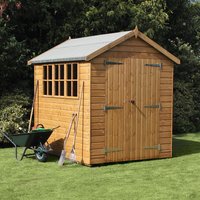Shed Bases 140 sq ft / 13 m² for Sale in UK
Showing all 2 resultsSorted by popularity
Discover the perfect foundation for your garden sanctuary with our extensive selection of shed bases designed to fit 140 sq ft / 13 m² spaces. Explore the variety of materials, shapes, and benefits each type of shed base offers, ensuring your garden structure remains stable and secure for years to come.
The Solid Ground: Types of Shed Bases
When it comes to shed bases, the material you choose can significantly impact the longevity and stability of your garden shed. Here are the most popular types:
- Concrete Bases: Known for their durability and strength, concrete bases provide a robust foundation capable of withstanding heavy loads and harsh weather conditions. Ideal for larger sheds, they offer a permanent solution that requires precise installation.
- Plastic Grid Bases: Lightweight and easy to install, plastic grid bases are an eco-friendly option made from recycled materials. They offer excellent drainage, preventing water accumulation and potential rot, making them suitable for wetter climates.
- Timber Frame Bases: For a more natural aesthetic, timber frame bases are a popular choice. They are easy to assemble and provide good ventilation, which helps to prevent moisture build-up. However, they may require additional treatment to protect against rot and insects.
Shaping Your Space: Finding the Right Form
The shape of your shed base is just as important as the material. Depending on your garden layout and shed design, you might consider the following forms:
- Rectangular Bases: The most common shape, offering a straightforward solution that accommodates most traditional shed designs. Perfect for aligning with garden boundaries or fences.
- Square Bases: Ideal for compact spaces or square-shaped sheds, these bases maximize usable area and are easier to level and install.
- Custom-Shaped Bases: For more unique shed designs or irregular garden spaces, custom-shaped bases provide the flexibility to fit any layout, though they may require professional installation.
Benefits That Build Confidence
Choosing the right shed base comes with a host of advantages that enhance the functionality and longevity of your garden shed:
- Enhanced Stability: A well-chosen base ensures your shed remains level and stable, preventing shifting or settling over time.
- Improved Drainage: Properly constructed bases promote drainage, reducing the risk of water damage and prolonging the life of your shed.
- Ease of Installation: Many modern shed bases are designed for easy installation, saving you time and effort in setting up your garden structure.
Spotting the Differences: Key Considerations
Understanding the differences between shed base options is crucial to making an informed decision. Here are some factors to consider:
- Cost: Concrete bases tend to be more expensive due to the materials and labour involved, while plastic and timber bases offer more budget-friendly alternatives.
- Installation: DIY enthusiasts may prefer plastic or timber bases for their ease of installation, whereas concrete bases often require professional help.
- Environmental Impact: Consider the environmental footprint of your choice. Plastic bases made from recycled materials offer a sustainable option.
Pro Tips for Your Perfect Shed Base
Ensure your garden shed stands the test of time with these expert tips:
- Level Ground: Always start with a level surface to ensure stability and proper weight distribution.
- Drainage Considerations: Incorporate a slight slope in your base design to facilitate water runoff.
- Regular Checks: Periodically inspect your shed base for signs of wear or damage, addressing any issues promptly to maintain integrity.
Creating the perfect foundation for your garden shed is a critical step in ensuring its durability and functionality. By carefully selecting the appropriate material, shape, and installation method, you can enjoy a stable and long-lasting structure that enhances your outdoor space.

